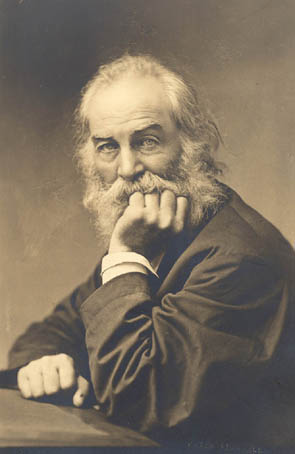Walt Whitman
(1819 - 1892)

Whitman is the most Homeric voice since Homer,
in spite of the modern’s ruder,
less elevated aesthesis of speech.
SRI AUROBINDO
Out of the Cradle Endlessly Rocking
Out the cradle endlessly rocking,
Out of the mocking-bird’s throat, the musical shuttle,
Out of the Ninth-month midnight,
Over the sterile sands and the fields beyond, where the child leaving his bed wander’d alone, bareheaded; barefoot,
Down from the shower’s halo,
Up from the mystic play of shadows twining and twisting as if they were alive,
Out from the patches of briers and blackberries,
From the memories of the bird that chanted to me,
From your memories sad brother, from the fitful risings and fallings I heard,
From under that yellow half-moon late-risen and swollen as if with tears,
From those beginning notes of yearning and love there in the mist,
From the thousand responses of my heart never to cease,
From the myriad thence-arous’d words,
From the word stronger and more delicious than any,
From such as now they start the scene revisiting
As a flock, twittering, rising, or overhead passing,
Borne hither, ere all eludes me, hurriedly,
A man, yet by these tears, a little boy again,
Throwing myself on the sand, confronting the waves,
I, chanter of pains and joys, uniter of here and hereafter,
Taking all hints to use them, but swiftly leaping beyond them,
A reminiscence sing.
Once Paumanok,
When the lilac-scent was in the air and Firth-month grass was growing,
Up this seashore in some briers,
Two feather’d guests from Alabama, two together,
And their nest, and four light-green eggs spotted with brown,
And every day the he-bird to and fro near at hand,
And every day the she-bird crouch’d on her nest, silent, with bright eyes,
And every day I, a curious boy, never too close, never disturbing them,
Cautiously peering, absorbing, translating.
Shine! shine! shine!
Pour down your warmth, great sun!
While we bask, we two together.
Two together!
Winds blow south, or winds blow north,
Day come white, or night come black,
Home, or rivers and mountains from home,
Singing all time, minding no time,
While we two keep together.
Till of a sudden,
May-be kill’d, unknown to her mate,
One forenoon the she-bird crouch’d not on the nest,
Nor return’d that afternoon, nor the next,
Nor ever appear’d again.
And thenceforward all summer in the sound of the sea,
And at night under the full of the moon in calmer weather,
Over the hoarse surging of the sea,
Or flitting from brier to brier by day,
I saw, I heard at intervals the remaining one, the he-bird,
The solitary guest from Alabama.
Blow! blow! blow!
Blow up sea-winds along Paumanok’s shore;
I wait and I wait till you blow my mate to me.
Yes, when the stars glisten’d,
All night long on the prong of a moss-scallop’d stake,
Down almost amid the slapping waves,
Sat the lone singer wonderful causing tears.
He call’d on his mate,
He pour’d forth the meanings which I of all men know.
[…]
Sri Aurobindo’s remarks:
«Whitman’s first poem in Sea Drift [“Out of the Cradle Endlessly Rocking”] and a number of others are written partly or throughout in this manner. When he gives us the dactylic and spondaic harmony of his lines,
Out the cradle endlessly rocking,
Out of the mocking-bird’s throat, the musical shuttle,
Out of the Ninth-month midnight,
one of them wanting only one foot to be a very perfect hexameter or the subtly varied movement of this other passage,
Over the hoarse surging of the sea,
Or flitting from brier to brier by day,
I saw, I heard at intervals the remaining one, the he-bird,
The solitary guest from Alabama.
one has almost the rhythmical illusion of listening to a Sophoclean or Aeschylean chorus. In the opening stanzas of the noble Prayer of Columbus, there is a continuous iambic metrical stress, but with the choric movement.»
«Whitman writes with a conscious sense of his high function as a poet, a clear self-conception and consistent idea of what he has to cast into speech —
One’s-Self I sing, a simple separate person,
Yet utter the word Democratic, the word En Masse…
Of Life immense in passion, pulse, and power,
Cheerful, for freest action form’d under the laws divine,
The Modern Man I sing.
No other writer of the time has had this large and definite consciousness of the work of a modern poet as a representative voice of his age, this inspiring vital sentiment of the nation conceived as a myriad-souled pioneer of human progress, of mankind, of universal Nature, of the vast web of a universal thought and action. His creation, triumphing over all defect and shortcoming, draws from it a quite broadness of view, vitality of force and sky-wide atmosphere of greatness.»
Prayer of Columbus
A batter’d, wreck’d old man,
Thrown on this savage shore, far, far from home,
Pent by the sea and dark rebellious brows, twelve dreary months,
Sore, stiff with many toils, sicken’d and nigh to death,
I take my way along the island’s edge,
Venting a heavy heart.
I am too full of woe!
Haply I may not live another day;
I cannot rest O God, I cannot eat or drink or sleep,
Till I put forth myself, my prayer, once more to Thee
Breathe, bathe myself once more in Thee, commune with Thee,
Report myself once more to Thee.
[…]
